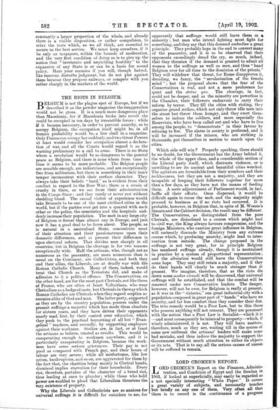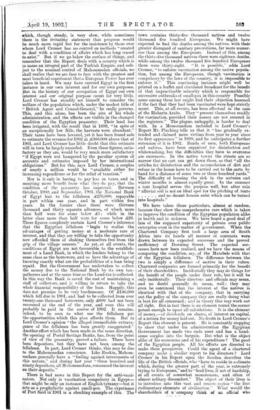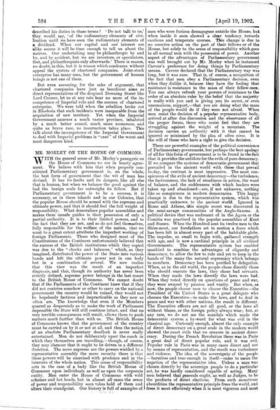LORD CROMER'S REPORT.
LORD CROMER'S Report on the Finances, Adminis- tration, and Condition of Egypt and the Soudan in 1901, if looked at superficially, may easily be regarded as a not specially interesting " White Paper." It covers a great variety of subjects, and necessarily touches but briefly on any one of them. Very often all that there is to record is the continuance of a progress which, though steady, is very slow, while sometimes there is the irritating statement that progress would be much more rapid. but for the insistence by those over whom Lord Cromer has -no control on methods "created to deal with a condition of affairs which has long ceased to exist." But if we go below the surface of things, and remember that. the Report, deals with a country which is in name an integral part of the Turkish Empire, and sub- ject to the nominal control of . Mahommedan officials, we shall realise that we are face to face with the greatest and most beneficial experiment that a European Power has ever taken in hand. We may have entered Egypt in the first instance in our own interest and for ow own purposes. But in the history of our occupation .of Egypt our own interest and our original purpose count for. very little. Lord. Cromer has steadily set himself to consider the welfare of the population which, under the modest title of British Agent and Consul-Geueral," he really governs. This, and this alone, has been the aim of his whole administration, and the effects are visible in the changed condition of the Egyptian peasantry. Their land has been irrigated,-with the result that in 1899, " spite of an exceptionally low Nile, the harvests were abundant." Their taxes have been lowered, yet it has been found safe to estimate the revenue for 1902 at £360,000 above that of 1901, and Lord Cromer has little doubt that this estimate will in turn be largely exceeded. Even these figures, satis- factory as they are, would be very much more satisfactory "if Egypt were not hampered by the peculiar system of accounts and estimates imposed by her international obligations." But for this, says Lord Cromer, a surplus of ' nearly a million would be "available either for 'increasing expenditure or for the relief of taxation."
' Nor, is it only in having to pay less in taxes, and in receiving` more benefit from what they do pay, that the condition of the peasantry has improved. Between October, 1900, and September, 1901, the National Bank of Egypt lent to the fellaheen £276,000, repayable in part within one year, and. in part within five years. In the .former class there were thirteen thousand and thirty separate advances, of which more than half were foi: sums below £5 ; while in the latter class more than half were for sums below £20. These figures completely sustain Lord Cromer's inference that the Egyptian fellaheen " begin to realise the "advantages of getting money at a moderate rate of interest, and that they are willing to take the opportunity now afforded them of shaking themselves free from the grip of the village usurers." As yet, at all events, the conditions of Egypt are not favourable to the establish- ' ment of a Land Bank, in which the lenders belong to the same class as the borrowers, and so have the advantage of knowing exactly what are the probabilities of a loan being 'repaid. But the Government has undertaken to collect the money due to the National Bank by its own tax- "gatherers and at the same time as the Land-tax is collected. In this way the Bank is saved the cost of maintaining a staff of collectors, and is willing in return to take the whole financial responsibility of the loan. Happily, this does not promise to be very burdensome. Of £146,000 which fell due in 1901, and had to be collected from over twenty-one thousand borrowers, only £600 had not been recovered at the end of the year, and even this will probably be paid in the course of 1902. It remains, indeed, to be seen to what use the fellaheeu put the opportunities which this plan affords them. But in Lord Cromer's opinion "the alleged irremediable extrava- gance of the fellaheen has been greatly exaggerated." Another effort which has been made in the same direction, the opening of Postal Savings Banks, has, from" the point of view of the peasantry, proved a failure. There have been depositors, but they have not been among the fellaheen. In part, Lord Cromer thinks, this may be due to the Mahommedan conscience. Like Ruskin, Mahom- medans generally have a " feeling against investments of this nature," and during last year " three hundred and ninety depositors, all Mahommedans, renounced the interest on 'their deposits."
There is bad news in this Report for the anti-vacci- nators. Not only is vaccination compulsory in Egypt— that might be only an instance of English tyranny—but it as a prophylactic against email-pox. The experience of P6rt Said m-1901 is a. shocking example of this. The town contains thirty-five thousand natives and twelve thousand five hundred Europeans. We might have expected to find the deaths among the natives, with their greater disregard of sanitary precautions, far more numer- ous than among the Europeans. Instead of this, among the thirty-five thousand natives there were eighteen deaths, while among the twelve thousand five hundred Europeans there were thirty-eight. " It is possible," adds Lord Cromer, " to enforce vaccination among the native popula- tion, but among the Europeans, though vaccination is compulsory by the laws of the country, it is impossible to enforce it." This convincing instance might well be printed on a leaflet and circulated. broadcast for the benefit of that impracticable minority which is responsible for successive outbreaks of small-pox in this country Possibly some among these last might find their objection lessened if the fact that they had been vaccinated. were kept strictly secret. This, at all events, has been effectual in the case of the Bisharin Arabs. They " present themselves readily for vaccination, provided their names are not entered in the registers." The plague, unhappily, is harder to deal with. In a Memorandum included in Lord Cromer's Report Mr. Pinching tells us that it " has gradually ex- tended and claimed more victims from year to year since its first appearance" in 1899, and he anticipates a further extension of it in 1902. Bands of men, both Europeans and natives, have been organised for disinfection and whitewashing, but the difficulties they have to overcome are enormous. In the native towns the streets are so narrow that no cart can get down them, so that "-all the articles for disinfection and the accumulation of dirt and refuse in the house have to be carried out to the carts by hand for a distance of some two or three hundred yards.' The difficulty of housing the sick in the autumn. and winter months is almost equally great. In the summer a tent hospital serves the purpose well, but after rain " alluvial soil is not an ideal spot for the pitching of. tents and no decent houses exist which can be turned into hospitals."
We have taken these particulars, almost at random, because they show the comprehensive care which is taken to improve the condition of the Egyptian population alike in health and in sickness. We have heard a good deal of late of the supposed superiority of private over public enterprise even in the matter of government. When the Chartered Company first took a large area of South Africa into its hands all manner of contrasts were drawn between its expected successes and the proved inefficiency of Downing Street. The expected suc- cesses have now been realised, and we have the means of comparing the condition, say, of the Matabele with that of the Egyptian fellaheen. The difference between the two is simply a difference of motive in their rulers. Chartered companies are formed primarily for the benefit of their shareholders. Incidentally they may do things for the benefit of the people under their rule, but it will be only incidentally. Their directors and officials may mean, and no doubt generally do mean, well ; they may even be convinced that the interest of the natives is identical with that of the company, that in carrying out the policy of the company they are really doing what is best for all concerned ; and in theory this may work out all right. But in fact there is an element round. the corner potent enough to upset all calculations. It is the element of money,—of dividends on shares, of interest on capital, of a return for money laid out. No doubt in Lord Cromer's Report this element is present. Ho is constantly stopping to show that under his administration the Egyptian Government has made two ends meet and has a, hand- some surplus into the bargain. But what is the object alike of his economies and of his expenditure ? The good of the Egyptian. people. All his efforts are directed to make them prosperous. Could the agent of a chartered company make a similar report to his directors ? Lord Cromer in his Report upon the Soudan describes the life of the British officials, who "have to reside in a climate which, during the greater part, of the year, is extremely trying to Europeans," and to " lead lives, if not of hardship, at all events of somewhat monotonous, and often of almoit solitary discomfort." The object of their lives is to introduce into this vast and remote region " the first rudimentary elements of civilisation." What would the shareholders of company think of an official who described his duties in these terms ? Do not talk to us,' they would say, of the rudimentary elements of civi- lisation until we have seen the rudimentary elements of a dividend. When our capital and our interest are alike secure it will be time enough to tell us about the natives. Our undertaking may be philanthropic by and by, and by accident, but we are investors, or speculators, first, and philanthropists only afterwards.' There is reason, no doubt, in this, but it is reason which condemns without appeal the system of chartered companies. Joint-stock enterprise has many uses, but the government of human beings is not one of them.
But even assuming, for the sake of argument, that chartered companies have just as beneficent aims as direct representatives of the despised Downing Street like Lord Cromer, let us at any rate hear no more of the in- competence of Imperial rule and the success of chartered enterprise. We were told when the rebellion broke out in Rhodesia that such incidents were inseparable from the acquisition of new territory. Yet when the Imperial Government annexes a much vaster province, inhabited by a much better armed, much more numerous, and quite as brave race, no insurrection takes place. This talk about the incompetence of the Imperial Government to deal with Imperial problems is "cant" of the worst and most dangerous kind.












































 Previous page
Previous page